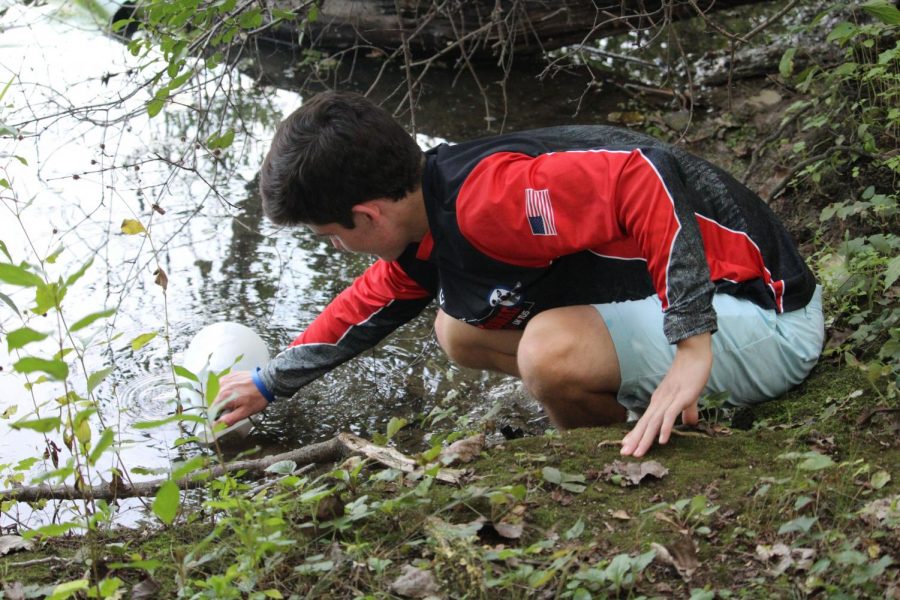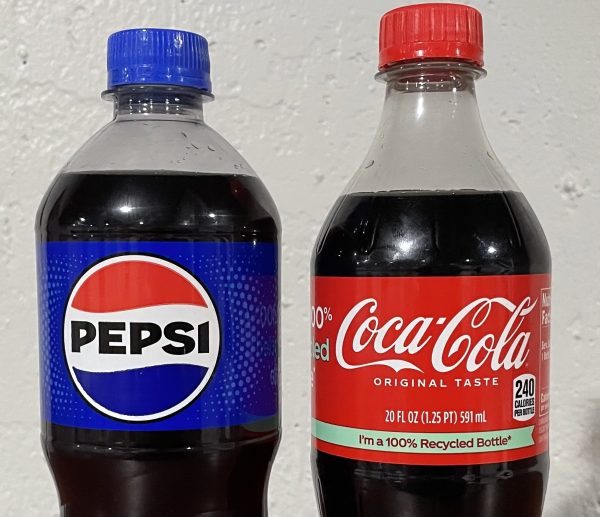Science classes research Butler Lake fish kill
Matt Engfer, a senior in Mrs. Jennifer Kahn’s AP Environmental Science class, is taking samples of Butler Lake for their experiment to measure the acidity and conductivity of water.
After many fish in Butler Lake died suddenly, the AP Environmental Science classes investigated the event and reported their findings to the Village of Libertyville in an effort to prevent another fish kill.
A “fish kill” is defined by Dictionary.com as “the sudden destruction of large quantities of fish,” which is what occurred in late August at Butler Lake, located across from the LHS campus. The abundance of dead fish in Butler Lake, according to Lake County water specialist Gerard Urbanozo, was due to the lack of dissolved oxygen in the lake when an herbicide was applied. The weed killer removed excess vegetation, which enhances fish diversity, depleting the already drained dissolved oxygen source necessary for the survival of the fish.
“The Lake County Health Department always recommends most of these treatments to be done early in the year, when the temperatures are lower and the dissolved oxygen is higher,” said Urbanozo.
He added that studies conducted on Butler Lake’s water quality in 2005 and 2015 show it historically has low dissolved oxygen levels, especially in August, because when temperature increases, dissolved oxygen levels tend to decrease.
Mr. Urbanozo clarified the herbicide was not the sole cause of the die-off. In fact, there was a chance a fish kill would have occurred anyway. Butler Lake is cleaner that other lakes in Lake County, such as St. Mary’s and Loch Lomond, because its aquatic life uses up nutrients and traps sediments, but any shallow, natural lake is susceptible to a fish kill. Lakes in the summertime tend to stratify due to phosphorus release from sediments, which in Butler Lake led to a lack of oxygen at the bottom of the lake.
Attention was drawn to the dead fish in August when a student running for cross country noticed the floating fish and notified LHS principal, Dr. Tom Koulentes.
AP Environmental Science teacher Mrs. Jennifer Kahn opened up the possibility for her students to study the fish kill at Butler Lake, and the overwhelming majority of them said yes. They began a project that expanded across three class periods, keeping a collaborative Google document to communicate.
“[The kids] were teaching themselves; I did not give them any instruction during that time. The students had to decide how they were going to organize themselves to answer the question: What killed the fish?” stated Mrs. Kahn.
The students split into four groups, focusing on either water, herbicide, sampling and research.
“We tried to figure out [information on] the herbicide that was applied to the lake, which [was] really difficult because none of the information was out to the public,” expressed junior Lizzie Behnke, a member of the research group. The students discovered information about Butler Lake’s water quality through their own observations, using equipment that they learned to master themselves.
“[The communication strategy] worked for the most part; there were challenges because some people had some ideas about what they wanted to do and it was hard when they’re not face-to-face with someone to collaborate,” admitted Mrs. Kahn.
Despite the difficulties, the students were able to exchange information effectively with Google Drive throughout the process.
By focusing their report on Butler Lake before, during and after the fish kill, students were able to reach the same conclusion the Lake County Health Department did: the herbicide, combined with the already low dissolved oxygen levels, killed the majority of the larger fish (that require more oxygen), leaving only smaller fish.
In September, the environmental science classes gave a presentation to Libertyville mayor, Terry Weppler, to discuss their conclusions.
The Lake County Health Department has already taken steps to prevent another die-off of fish. According to Mrs. Kahn, this includes banning homeowner use of phosphorus and installing two aerators (large fans) on Butler Lake to disperse the water and prevent stratification. There has been a reduction in road salt (which spreads a harmful amount of chlorine into lakes), and the department, as well as the AP Environmental students, recommend hiring a contractor to cut the plants rather than use chemicals that have unforeseen consequences.




![Mr. Abullh Ali, manager/assistant, helps open Queen Yemeni Coffee in downtown Libertyville at 606 North Milwaukee Ave. With the help of employees such as manager and LHS senior Yousef Taha, they are able to bring the Yemeni and Ethiopian culture to Libertyville by using their Queen spices, cinnamon and cardamom in their drinks such as Adani Chai, which is inspired by Sheda, the Queen of Yemen and Ethiopia. “The history of our coffee [is] a long history and we believe that Yemen and Ethiopia started the coffee and we are bringing something unique to the community,” Mr. Ali said.](https://www.lhsdoi.com/wp-content/uploads/2025/04/Photo-1-600x400.jpg)



